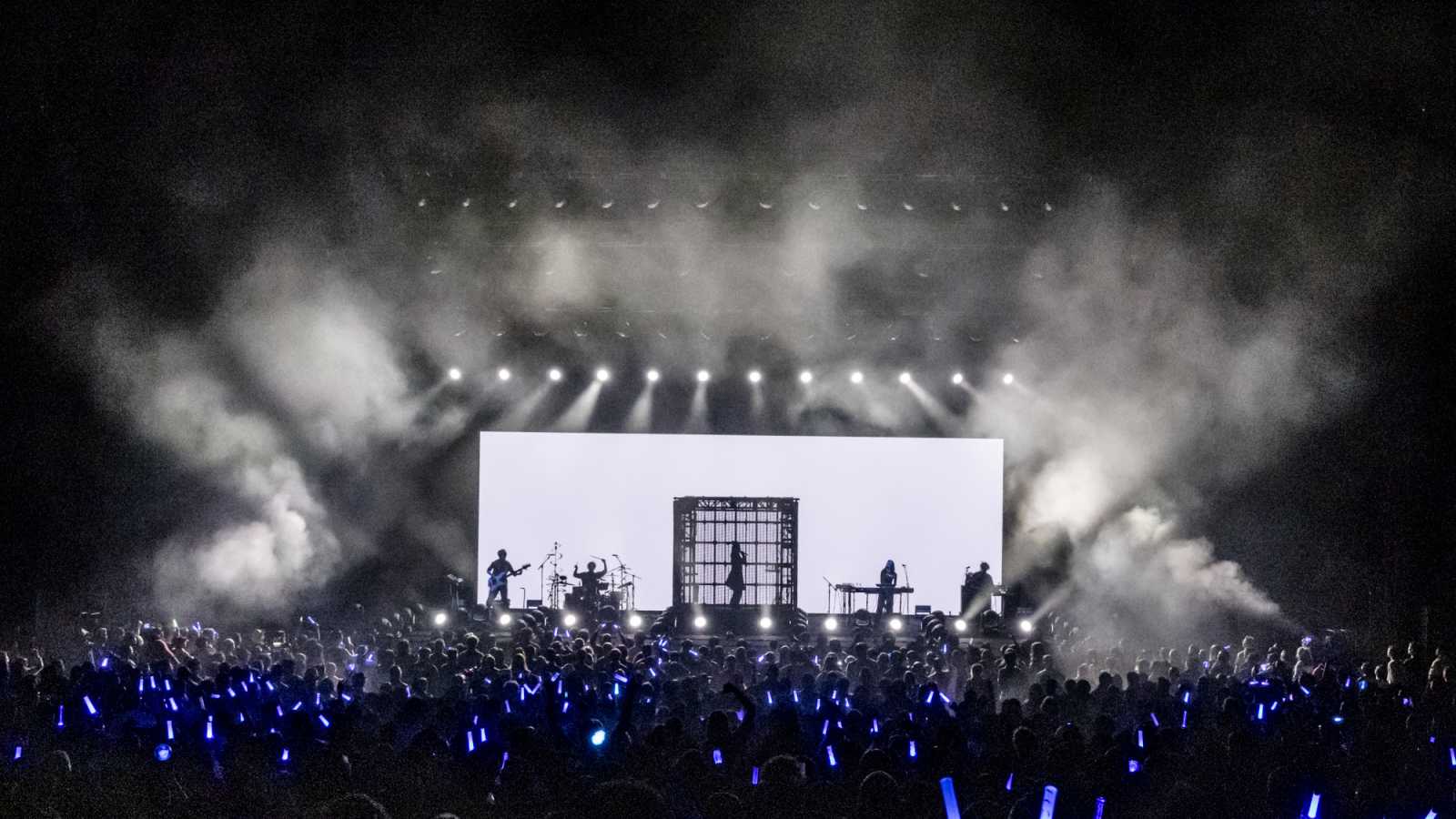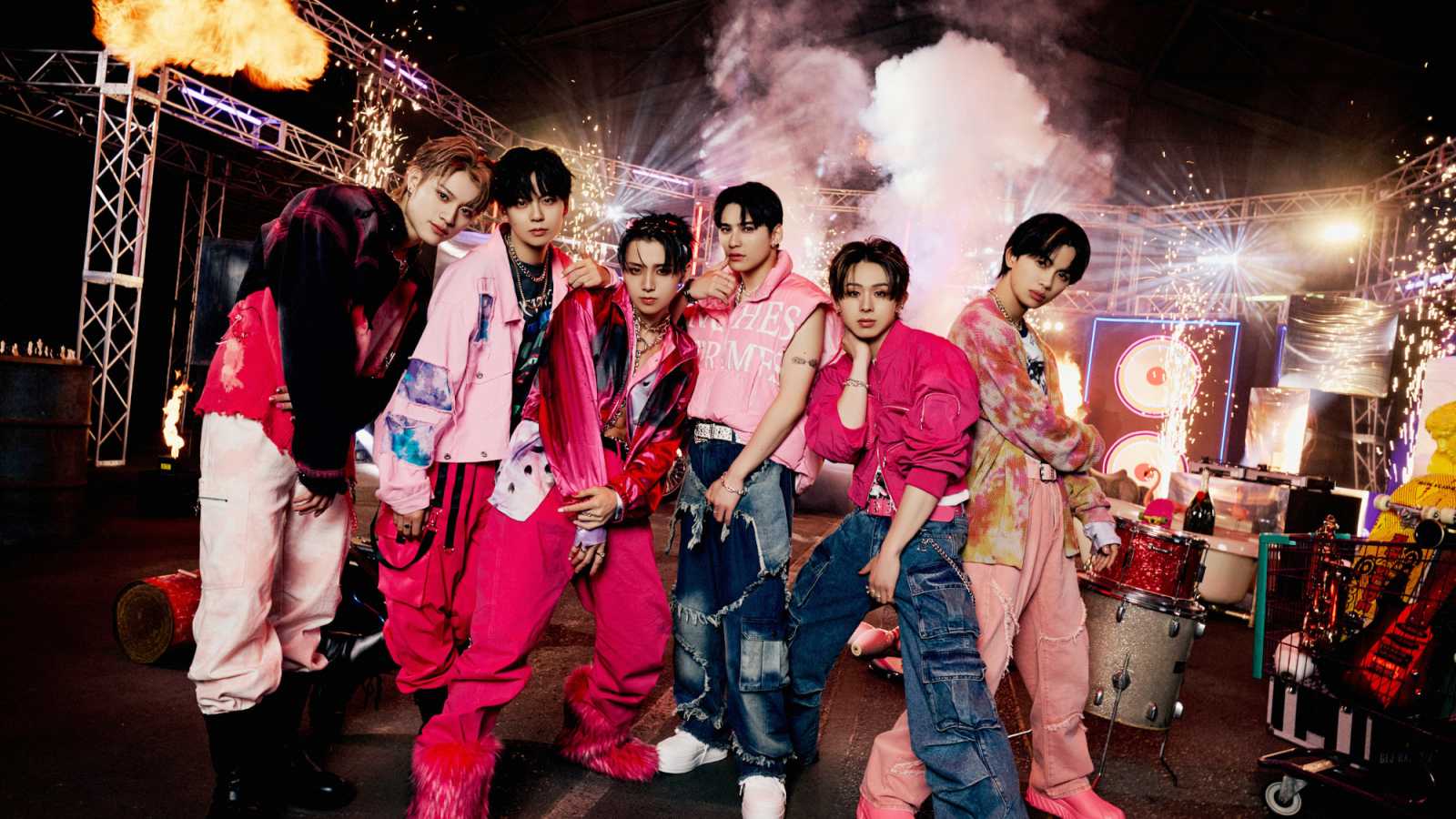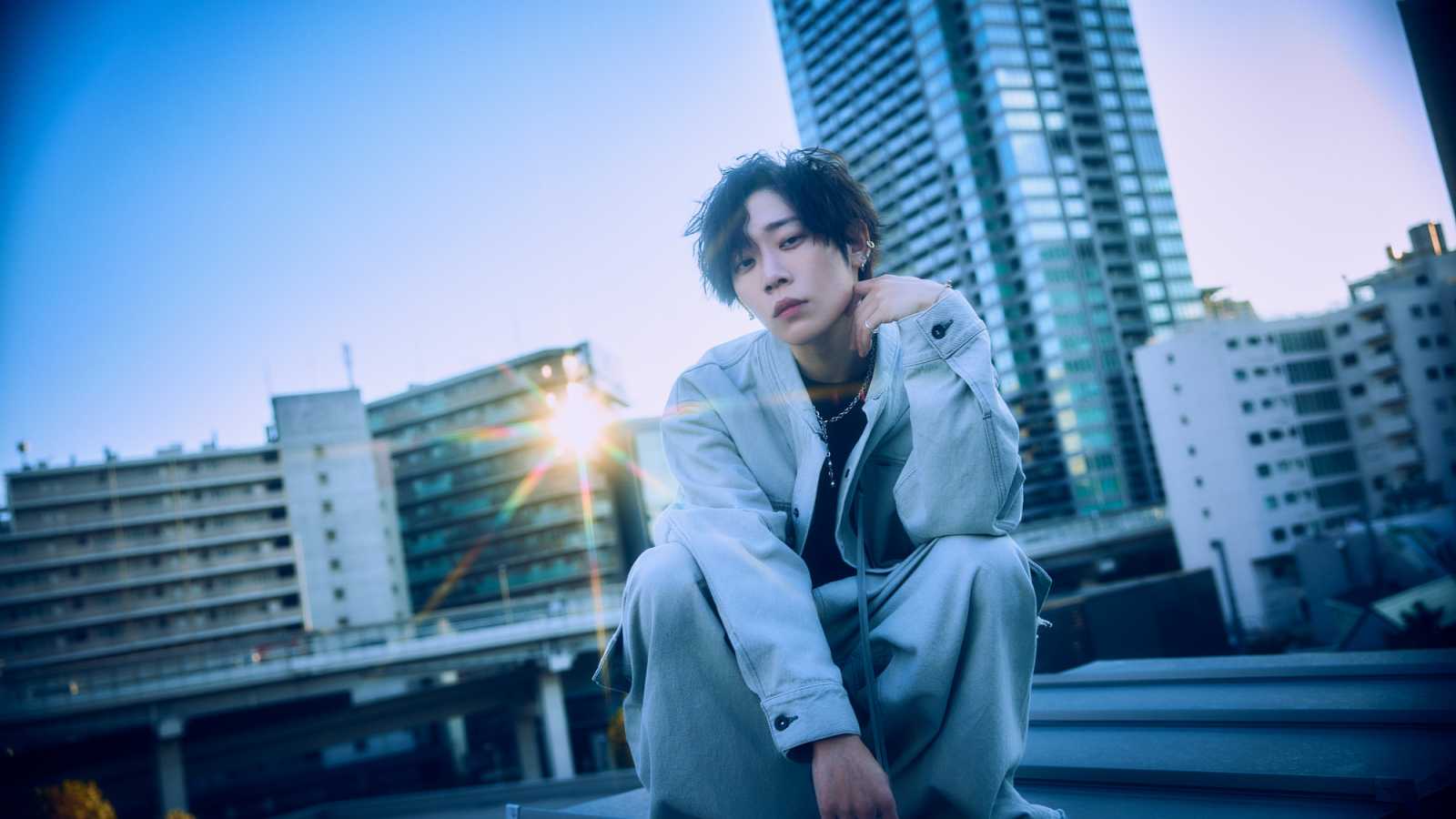An interview with YOW-ROW in Japan before their appearance at the French convention JAPAN EXPO.
Could you please introduce yourself?
YOW-ROW: Im YOW-ROW (Youichirou) of GARI.
Your band has three other members: guitarist, Yutaka Dokko, bassist, Naoki Fujimoto, and drummer, Kei Kusakabe. In your profile it says these three members created a session band in 1997, and then you joined. How did you meet these members?
YOW-ROW: I used to make music by myself in my home, but then I wanted to start a new band. They didnt have a vocalist at the time and they were looking for a permanent vocalist. It was really good timing on both our parts.
Did you meet each other in a live house?
YOW-ROW: I actually had never met them before. I put up ads looking for band members in instrument shops, live houses, and music magazines, and that is how we met.
Is the music you created in the past different from what you create now?
YOW-ROW:Yes. About 10 years ago, my music was dance music, which I made alone using my computer at home. The other three members played rock music using just their instruments.
Did you sing with a rap-style and play music like a DJ back then?
YOW-ROW: No, I didnt sing like I do in GARI and the band didnt play like we do now at all.
What is the origin of your bands name?
YOW-ROW: As you know, GARI is the salty-sweet ginger put next to sushi in a sushi bar! (burst out laughing) They had already played under the band name GARI before I joined and I had asked the members the reason for their name. They said it was after a spice, like the Red Hot Chili Peppers, and they wanted to go with that idea, but also keep a tie to something Japanese. I guess they also thought about names like wasabi (Japanese horseradish) or karashi (mustard). (laugh)
How would you describe your vision of music? Is it just a simple mix of electro and rock?
YOW-ROW: Generally speaking, yes, I think that you could say that. Before, real instrument music and dance music were in different categories, so many musicians chose one or the other. About 10 years ago, the genres gradually crossed over. We couldnt choose one or the other, so we decided to do both types of music and use their best points.
Where does your inspiration come from?
YOW-ROW: It depends on the song. Sometimes I go out to places where music is really loud, such as clubs and other lives, to search for comfortable sounds. Sometimes I stay at home, arrange many instruments, and add the sounds one by one to make songs. Actually, there is also a song in which I play acoustic guitar.
Do you play other instruments too?
YOW-ROW: Yes. I can play guitar, keyboard, drums, and bass, so I create some songs from drum beats and some by playing bass, which seems completely different. Thats why each song has its own original character.
So you dont have concrete inspiration that comes from seeing a movie or looking through pictures?
YOW-ROW: Well, I sometimes get inspiration from that. About movies, their background music or theme songs are something that we aim to do. Besides my visual sense, there are many songs that start from the vibrations which I feel when I walk around town.
How do you write your music?
YOW-ROW: Basically, I arrange the sound elements on my MAC, and I stack the sounds thoroughly by myself, then arrange the sounds with the members. So I mostly make a song's base by temporarily playing the bass and guitar parts, then adding the melodies, and finally discussing with the other members what they think about it. From there we make the music together rather than making it all together from the beginning.
Do you add the lyrics later?
YOW-ROW: In that stage, if the song already provides strong images, the lyrics are already there, so there are only a few songs that have no words. I try to bring songs to the members after I put in melodies and lyrics, at least in the main parts, because without any words the members cant really imagine the songs that Im singing.
At that time, do you talk with members about the theme and concepts that are the basis of those songs?
YOW-ROW: Yes. I spend a lot of my time doing that. At that stage, at least the titles of songs are determined, and I explain why those titles are used so the other members will have an image in their mind of what I'm trying to say. For example, I would explain to the members that Im singing about the universe, or singing about love, or about daily life.
When you select the songs, are some songs not used, or changed a lot?
YOW-ROW: Yes. We put 12-13 songs into one album, but actually we make more than two times this number of songs. We compare the songs and select the best. Many songs dont make the cut, not because of their quality, but for the timing, like This time our concept is this, so we wont choose this one at this time, and sometimes the songs that dont make it are put into the next album.
Do you make a concept for each album?
YOW-ROW: Yes.
After you give your songs to the other members, do they each arrange the parts for their own instruments?
YOW-ROW: Basically.
You have created your own label, DeadstocksandwicH Records, but just after the releases Flight Recorder and BRAIN SHOOTER, you began to work on compilation albums featuring other artists. Why did you make this decision?
YOW-ROW: We played in the Indies scene for a long time, we had difficulties, such as not being able to do what we wanted to. We created the label out of our frustration at not being able to work how we wanted to. But then, after those releases, we found ourselves working with other artists on compilations, and we got more wrapped up in the shared experience.
And how did you come back to the composing?
YOW-ROW: I have written the lyrics to our songs since I started music, while some members composed or we all composed together. But sometimes when we made our music together, we reached something different than what I was aiming for. That is a good point for a band, but sometimes I felt that it somehow ended up different than what I wanted.
I felt that if I did not make the music and lyrics myself, the music would not turn out how I wanted it to. So then I started to tell the other members I want to play this song like this, but did not demand the members to play as I wanted them to.
In the song CRIME, I was a bit surprised because your lyrics are a little violent:
"Saenai Jesus Christ charisma wa fumou
Nani wo shiji shitai ? Mass Media
Mienai kono shihai ni F.U."
(Translation = "Jesus Christ, insignificant being with a sterile charisma, what do you want to support? Mass Media. To this invisible domination, I send an F.U.")
What do you mean by these lyrics? Did you write them when you were angry?
YOW-ROW: (laugh) Well, I guess I was in a bad mood at that time.(laugh) I think when I wrote it we had some problems with our music. We worked very hard but things werent going so well. Maybe the problem was in us, but we didnt think so, and we thought Why wont the mass media listen to us?, or maybe our message was Please notice us." Our Indies period was quite long and we worked hard and seriously on our music, but we couldnt get good a reception despite all that effort. On the other hand, I wondered Why is only a certain kind of music received well?, and worried about many things. For example, god is in the lyrics, which meant If there is really a god, please save me. I think I wrote it like that.
YOW-ROW, I've seen that you like the album Battle of L.A. by Rage Against The Machine, and I'm not that surprised after I heard your voice. Could we say Zack de La Rocha's voice is not very different from your voice?
YOW-ROW: (laugh) About 10 years ago, when our music style changed to our present style, I was influenced by this band very much. Of course their sound, but also his strong messages. Even though I couldnt understand what he sang, it influenced me a lot.
Were you influenced especially by the vocalist, Zack?
YOW-ROW: Yes. I think the band showed the importance of putting a message in their sound. The band broke up, but Im following all of his activities including his music.
Is the song WIPE OUT! a tribute to the famous old video game, WIPEOUT, on Playstation? I really think your music could be the type that was added to this game, like The Prodigy, Chemical Brothers, Orbital, or Future Sound Of London, etc..
YOW-ROW: Now that was a surprise.(laugh) When you said that, I just remembered that we had a song with that title! (laugh) I didnt make songs for that game, but I remember those artists who made a sound track for the game.(laugh) Now I see their names and find we used to listen to their music often, because they were in the same musical category as us, and it was interesting to hear what they were doing. Im not sure whether I knew it when I made the song, but I didnt make the song to become a sound track.
How was it working on the remix album al.tru.is.tick with Tim Gane, FUNKY GONG, Jack Dangers, etc.?
YOW-ROW: When I finished our original album, e.go.is.tick, we were very satisfied with this work and very interested in what chemical reactions would happen if others arranged our songs, and we got the idea for a remix album. In the beginning it was such a small idea, and we gave artists names who we wanted to contribute to it, even if we didnt know whether they would or not. After that, our staff made appointments with them, they listened to our songs, and started working on it.
Did the artists choose the songs?
YOW-ROW: Yes. I wanted them to work as they liked after listening to our songs, so I didnt propose which songs we wanted them to arrange. They chose the songs they wanted to arrange most after they listened to our original album, e.go.is.tick.
How did you meet and work with Tsuyoshi Kusano, the cover designer of e.go.is.tick and al.tru.is.tick? He is very creative, his work usually looks simple, but up close it's complex.
YOW-ROW: We, our band and staff, also really care about aspects other than the music, such as the CD jacket and PVs. We want to release not only good music, but also a lot of things that have to do with our music. We met Mr. Kusano because we needed a designer who could make our images as we wanted. We discussed it a lot and created that with him.
Did you approach Mr. Kusano?
YOW-ROW: Yes. When we decided on our CD jacket, we didnt know him directly. Our staff, myself, and the others were looking for a person and Mr. Kusano was introduced to us because he matched our concept. Then he listened to our music and created something for us.
It seems hard and it must have taken a lot of time to make such a great PV.
YOW-ROW: I am sure that it was very difficult to work with us.(laugh)
What is the main message you want to give to people with your lyrics and music?
YOW-ROW: What I say is very personal, things about myself, how and what I think, or what I want things to be like. I dont think Im a special person, and I think others also complain about what I complain about, and others also dream of a future that I dream about, too. When I make songs, I dont think Im a man of the people at all, I sing about a very small part of myself like I dont like this or I hope the world will be like this, in which others seem to share my thinking, especially when I look back on my songs.
So your themes arent so big, like you want to change politics?
YOW-ROW: No. I write what I think about in my daily life.
Do you write down lyrics whenever you think of them ?
YOW-ROW: Yes, I do.
What is your vision of the future of Japanese music in America and in Europe?
YOW-ROW: Until now, many works in Japan have been to arrange the music coming from America and Europe and match it to the Japanese taste, but gradually music in Japan has become more original, I think. Thats why more and more Japanese artists work overseas. This type of music is not brand-new, but we Japanese arrange it and add Wabi (=austere beauty), and Sabi (=elegant simplicity), and then it becomes new, something original. I think its very good that it is listened to more than before, and we should be proud of that. I think our works will increase in the future.
YOW-ROW, do you have an awareness of your Japaneseness, and do you want to put your Japanese taste into your music?
YOW-ROW: Yes, I do. When I started music, I respected Western music and worked very hard to copy it. While I was working with this type of music, I wondered If a Japanese person were to do this, how would it be?, and I became very aware of my Japaneseness.
What are your feelings about e.go.is.tick / al.tru.is.tick being distributed in Europe?
YOW-ROW: I have never been to Europe, so I cant really imagine. I like music and I started loving Western music, so Im very happy that I can stand on the starting line at last with spreading Japanese music West, and I hope our music will be enjoyed more by people in many Western countries.
How do you feel about Western Music?
YOW-ROW: Until now, there were the big music categories of American and British music, but I never differentiated since I was influenced by both American and British music so much. However, I now feel Europe creates newer things. Before, I felt like British music was saturated and I listened only to American music, but now I feel American music hasnt changed so much, and I went back to European music. I feel like France and Germany create newer sounds than the UK now.
What are your next projects after the release of your last album, Masked?
YOW-ROW: Now Im making songs at home, working toward our next release. And we do lives; we play in front of people and learn things like This kind of song, people like, which I dont know when I make songs at home. Now I play in lives, and think about our next release.
What are GARIs lives like? I think listening to the real instruments is quite different from listening to your CDs.
YOW-ROW: I think many people think so. Im sometimes disappointed to see lives of similar artists, thinking Its different from their CDs. I also think I shouldnt be like them. I like to play like our CDs, and add the dynamics that are only found or created in real lives. Maybe well want to play a different arrangement from that of our recordings in the future, but they are not that different, and we want to make people listening to our CDs think thats how we play in our lives, we want to satisfy them.
You're playing lots of lives with other artists. How did you choose these events?
YOW-ROW: I want more people to know the name of GARI, so I dont care about genre, and I want to play anywhere and with anyone. It sometimes feels good when I play in front of people who dont know GARI at all.
If you weren't involved in music, what would you do?
YOW-ROW: Its hard to say. But Im sure I would not work in art.(laugh) I think I would be very normal.
What are your hobbies when you're not playing music?
YOW-ROW: Um, I dont have a hobby.(laugh)
You mean your life is occupied solely by music?
YOW-ROW: Yes. The other members have various hobbies besides music, such as going fishing, drinking, but I dont have one.
GARI will appear at Japan Expo held in France in July 2007. Do you have any thoughts about what your first overseas live will be like?
YOW-ROW: Until now, Japanese artists of various genres and styles have played overseas and gotten various write ups. I want to give people a shock from a totally different angle, and want to play to make people think There is this kind of music in Japan. It will be our first appearance overseas, so I want to do our best.
Various people who like Japanese culture, animation, and music will come to Japan Expo, and you can express your music in front of them, which is wonderful.
YOW-ROW: In that way, we care about our design as well as our music, so we hope to convey our messages and other things with as much importance as our music as GARI. I want to do a live in which people who are interested in Japanese animation, manga, graphics, which are very different from music, would receive something from us.
Last message for our readers?
YOW-ROW: For us, this will be our first live overseas, so I really want to shock you. And well do just that, so please come and see us!
---
JaME would like to thank GARI, Soundlicious and Victor Entertainment.




